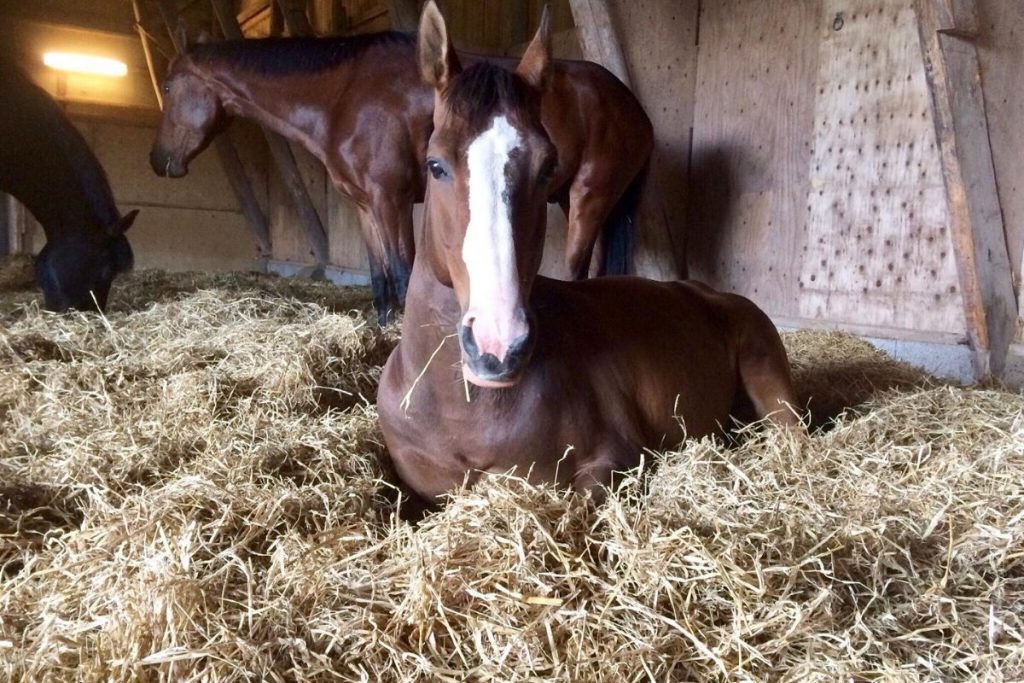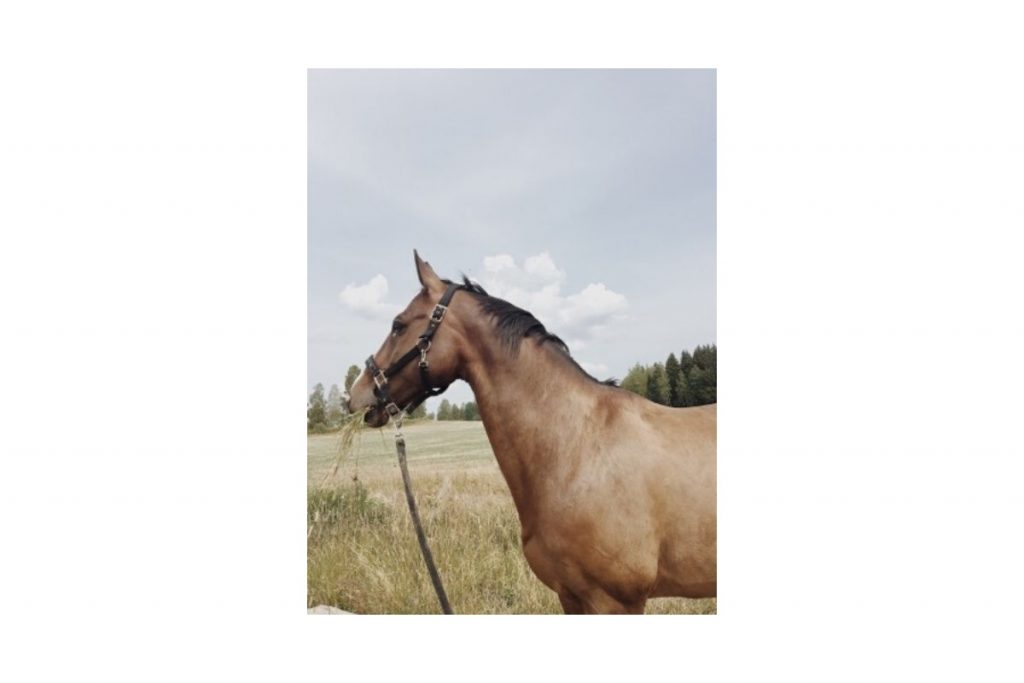Horses are playful and energetic animals with unique personalities. Caring for horses has become an obsession and a passion for many people. When caring for the needs of these amazing animals, it is important to consider proper horse nutrition and their weight.
Can a horse eat too much hay? Yes, a horse can overeat and become obese from hay just as easily as grazing in a lush pasture, so it is crucial to set up a feeding pattern that helps horses maintain a healthy weight.
This article will discuss what the right amount of hay for your horse is, depending on its nutritional needs, and how to help your horse maintain an ideal weight.
Can a Horse Eat Too Much Hay?
Horses can easily eat too much hay and become overweight. To prevent this from occurring, it is vital to understand how a horse feeds so that you can mimic their natural feeding tendencies.
Horses are Built for Foraging
A horse has a digestive system that is built for foraging. If horses can graze throughout the day, they tend to regulate what they eat and eat just the right amount of food for their needs. Horses are foraging animals, so mimicking their natural feeding habits is best.
How Free Feeding Fits in with Foraging
Horses are foraging animals, and if given a choice, they would like constant access to hay. Horses who free feed hay tend to be relaxed and content, and it also reduces behaviors such as chewing on wood.
What About Water?
When horses forage in a field, they have access to fresh grass, which is comprised of 90 percent water. All this extra water helps horses digest their food. However, hay is dry, so horses need to balance out the dry hay with water. You can expect a horse to need at least 3.6 liters of water for every couple of pounds of hay they consume.
Horses need lots water to help them digest what they eat. Also, the water must be as fresh as possible, so water should be dumped and replaced each day.
Water is critical for a horse for many reasons. It helps the horse’s digestive system from becoming impacted. If you wish to have your horse free feed on hay, having water to prevent dangerous illnesses is essential.

Can Horses Self-Regulate by Free Feeding Hay?
A horse’s digestive system is designed to consume small amounts continuously. When their food source is taken away, they become stressed because their survival instinct kicks in.
If a horse is allowed free access to hay, they will begin to self-regulate how much they eat, which, in turn, reduces their stress. It also helps keep their digestive system functioning correctly, which is essential for horse health.
If a horse is struggling with metabolic issues, the adjustment to free feeding hay may take a few weeks, but eventually, they begin to regulate themselves and eat just what they need.
Things to Watch Out for When Free Feeding Hay
- Be sure your horse has access to fresh water always.
- Hay should be evaluated for its sugar and starch content. This is especially necessary if there are concerns about weight gain or insulin resistance.
- Reduce or eliminate the grain your horse eats.
- Be sure the hay itself is fresh. It should be free from bacteria, mold, or dust.
Hay Quality Matters
The quality of the hay you feed your horses has a direct impact on the health of the horse. Square bales are preferred over round ones since round bales often include trash and burrs. Be sure you purchase your hay from a reputable source.
Several questions are reasonable to ask a hay seller, such as:
- Where is the hay from?
- Is the hay horse-feed quality?
- The average weight of bales.
- What crop is the hay?
- Where was the hay harvested?
- Has the hay been rained on?
What Happens to Overweight Horses?
According to the University of Minnesota Extension’s article ‘Caring for the Overweight Horse,’ horses that are overweight run the risk of developing significant medical issues.
- An overweight horse might develop laminitis, which is an inflammation of the layers of tissue inside the hoof of the horse.
- Equine metabolic syndrome, which is a collection of pathological changes in a horse, can put them at risk for other issues because of their obesity.
- Insulin dysfunction is also an issue.
- An elevated level of cortisol caused by stress can occur.
The extra weight an overweight horse carries can add a strain to the joints and feet, as well as cause stress to their heart and lungs. You might notice that an obese horse becomes tired easily and is not able to cool themselves off, either.
How Much Hay Is the Right Amount?
The right amount of hay for a horse depends on the season. A standard-sized horse around one thousand pounds will eat 15 to 20 pounds of hay in a day. However, in the winter, the caloric needs of a horse go up according to the University of Tennessee Extension’s article ‘Estimating Winter Hay Needs for Horses.’

How Much Should My Horse Weigh?
How much your horse should weigh depends on the horse itself. According to the University of Michigan, there are a couple of methods used to evaluate if a horse is overweight.
- A horse can be scored on their body condition, which looks at the fat deposits in several areas of the horse’s body.
- The girth to height ratio is also evaluated to determine their condition.
- The horse’s neck is assessed to determine the fat in the neck area, as well.
Using Hay Nets to Slow Feed Stalled Horses
‘Horse Weight Loss: Hay Nets and Limit-Fed Diets’ discusses research regarding hay nets for overweight horses. Published by the University of Michigan Extension, it explains common feed practices and how horses are sometimes stalled for long periods. Stalling horses prevents them from being able to forage and free feed hay.
If you can increase how much time it takes a horse to eat, you can decrease how much they eat at one time. The extended time it takes the horse to forage promotes weight loss. Researchers determined the use of a hay net helped stalled horses because the decrease in feeding time led to an increase of digestive health and a reduction of colic and unwanted behaviors.
It was also noted that the stalled horses fed from hay nets had lower insulin levels and lower stress hormones.
Hay Placement to Encourage Movement and Mimic Foraging
Movement is an essential part of foraging and weight management for a horse. To prevent a horse from overeating hay, encouraging movement while eating will slow down consumption and mimic a natural lifestyle for your horse.
Having multiple areas for your horse to feed keeps them moving, even in small spaces. Being able to choose where they are comfortable eating imitates the natural need to forage and be around other horses.
To Conclude
A horse can overeat, but there are ways to create a situation where a horse can self-regulate how much hay they eat by free feeding. Slowing down hay consumption by using hay nets for stalled horses can help your horse self-regulate feeding, as well.
Having multiple feeding areas in a pasture will mimic foraging for horses, and they will, in turn, be able to control their caloric intake naturally. Remember that the quality of the hay matters. High-quality hay that is low in sugar will positively impact the horse’s insulin levels, helping to keep them healthy.
